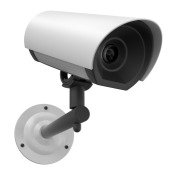Wireless Alarm Systems - Benefits and Advantages
Wireless alarm systems are becoming a popular option for homeowners. The technology is continuously advancing and the newer wireless systems are becoming more reliable than older versions were.
The two main classifications of alarm systems are wireless or wired systems.
There are a number of advantages and disadvantages to both systems. You need to determine your security strategy and find out which system is most appropriate for you.
Also, you need to determine if you will be going the do-it-yourself route or if you will have a company handle all of your security needs.
Knowing this will help in determining if wireless alarm systems is for you.
How Does a Wireless Alarm System Work?

Wireless Alarm Systems run on radio wave frequencies. These radio waves will detect motion and transmit the information to the control panel.
The control panel will then alert the sirens, contact a 3rd party, and/or contact the homeowner.
Benefits of Wireless Systems
Easy To Install
One of the main benefits of a wireless system is that the security system is relatively easy to install. With a wired system all of the devices and control panel are connected with wires. The wires need to be hidden so they go through walls, ceilings, and/or floors.
Whoever is installing a system needs to have a basic proficiency in electrical and carpentry knowledge.
On the other hand, with wireless alarm systems, you do not have to deal with the wires. You do not have to worry about running and hiding wires throughout the house. The ease of installation has really opened up the do-it-yourself market.
Where previously you might have had to hire a seasoned pro to install the system, wireless products allow almost anyone to install a security system.
A really general overview of a wireless DIY (Do-It-Yourself) installation is as follows: You would connect the control panel to an electrical outlet. Then you would position the sensors with highly adhesive sticky tape. Then you would activate the alarm. Not much to it, and you should be able to install within a half day from start to finish.
Add Devices Easily
Another benefit of a wireless system is that you can add new devices for new locations much easier than in wired systems. With a wired system, you would have to go back and run additional wires through the walls.
No Worries about Power Outages
Also, a wireless alarm system runs on batteries, specifically lithium batteries. You do not have to worry about power outages; your security system will not be affected.
Save Money
If you do go the route of a DIY installation of a wireless system, you have very good potential for saving money on a monthly basis. There is some upfront cost with the products, but if you use a home alarm monitoring company, you can save significant dollars on a monthly basis.
Disadvantages of Wireless Systems
Replace Batteries
In one way, wireless running on batteries is an advantage. In another way, having batteries is a disadvantage. You will have to replace the batteries on a periodic basis.

You will know when the batteries are running out because the alarm will beep. But if you are away, you will not know about it, and the alarm system will power off, rendering it useless.
Easier for a Criminal to Disable
Also, wireless systems are easier to disable for criminals. Some of the wireless systems have the control panel and key panel combined. With access to the control panel, a criminal can disarm the system. See if you can purchase wireless systems that have the devices separated.
More Chance of False Alarms
There is also a chance that you will have more false alarms than with wired systems. There is more chance of interference within a wireless system, causing the system to go off. Wired systems are closed-loop systems and have less chance of false alarms.
Watch Out for Large Distances
If you have a bigger residence, you need to make sure that the wireless system works well for the devices farther away from the control panel.
Summary
If you are considering to go the route of do-it-yourself regarding home security, wireless alarm systems should definitely be considered.
Related Content:
Wireless Internet and Your Security



